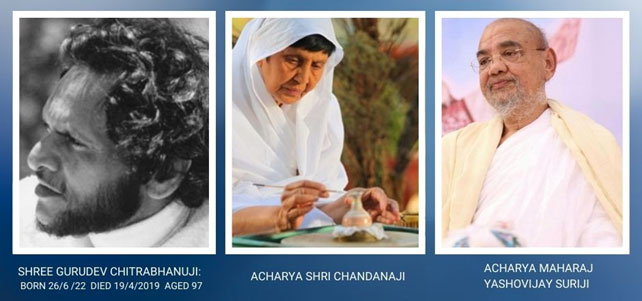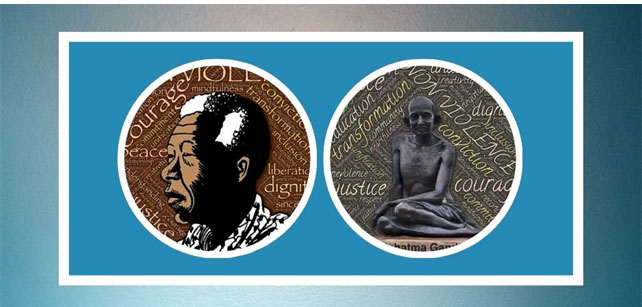Shree Gurudev Chitrabhanuji was initiated as a Jain monk at the age of 20. During his monkhood of twenty-eight years in India, he spent the first Five years in meditation and silence, talking only to his guru. Because of this maun sadhana experience, he emerged in the world with inner gaiety and enlightened spirit.
He attributed his long life to his daily practice of meditation, 3-4 hours of silence and a vegan diet. In an interview with the New York Times, he remarked that “the practice of silence curbs one’s desire to voice a premature opinion”
In his book “Lotus Bloom” he wrote the following, on the subject of, ‘silence.’
“Silence leads to a storage of vitality. Through silence dissipated energy is focused on to a centre again. And with energy canalised, speech attains a unique power. Silence thus provides an unfailing instrument to render one’s speech more dynamic. He who has regulated his speech through speech, whenever he chooses to speak, finds an ineffable joy in his speech, in the words he utters, in the thoughts he expresses. One who never experienced has had any experience of silence, cannot probably comprehend this secret; but he who has been cultivating silence must realise the impact of this truth. Wherefore, to those would be orators among the young of today, I should commend the cultivation of silence as a bewitching instrument of the art of elocution!”
Acharya Shri Chandanaji, affectionately also known as Tai Maharaj, and Chandanaji, became the first Jain nun to be conferred the title of Acharya in 1987.
She took diksha when she was only 14 years old. She took a twelve-year vow of silence to study Jain scriptures, the meaning and purpose of life and different religions. Her life encapsulates her life motto, “compassion in action”. To her, “obstacles are just milestones” and she somehow always finds a solution to any obstacle she comes across. She founded Veerayatan, Bihar n 1974. The organization’s pillars are simple: “Seva” (service to humanity), “Shiksha” (education), and “Sadhana” (self-development).
In an interview some years ago, she stated “Everything we do affects us here and now: even the future is too far away, let alone the next life. Every good deed is divine.” She went on to exhort everyone to love what they do, to do it with happiness, and to take pride in their happiness.
Acharya Maharaj Yashovijay Suriji took Diksha at the tender age of 11 under his Guru Ohmkar Suriji. He learned the basic principles of Jainism from his Guru but still struggled to find his real self. The Guru said, “I can guide; but only self can realize the true nature of self”. Hence at the age of 13, Acharya Shriji embraced maun and stayed in that state for over 30 years.
About the importance of Maun, Acharyaji said in an interview conducted more than a decade ago, “Knowledge remains superficial unless one absorbs its deeper meaning through introspection. Our likes and dislikes keep us in the external world. These likes and dislikes evaporate once we realize that all these are a result of our own fault or our delusion. Words are only required to stay in the outer world; no words are required to stay close to the soul. Unless one stays within, one cannot understand the reality of the self.” Acharyaji had stayed in maun until he was able to realize his self – Who I am? – That nameless self.
Why did he come out of maun?
“Only after one realizes the power of ego-less self, one can give the message of truth to the outside world. My Parmatama’s message was to first realize the power of the ego-less self. With that realization came a unique joy (anand). The second part of the message was to guide others to realize the same anand. A book of knowledge only provides the outline, but the joy of one’s soul can inspire another soul to the same joyful state”, said Acharyaji
Acharya Maharaj Yashovijay Suriji of the Shwetambar sect is a spiritual master. For some years now, he has been conducting five-day Maun Sadhana Shibirs in various reclusive places in India. On average about 700 Jain laypeople attend this transformational Maun shibirs, each time it is held.
In 2019, my sisters and I were fortunate to meet him. One knew, immediately, you were in the presence of someone special. It was a unique experience, one which we cherish and remember.
Acharya Mahaprajna exalted the benefits of silence stating “words once uttered get lost. Silence prevails forever. The song of the soul can only be heard in silence”
Power of Mauna








It was great seeing how much work you put into it. Even though the design is nice and the writing is stylish, you seem to be having trouble with it. I think you should really try sending the next article. I’ll definitely be back for more of the same if you protect this hike.
Thanks I have recently been looking for info about this subject for a while and yours is the greatest I have discovered so far However what in regards to the bottom line Are you certain in regards to the supply
I do trust all the ideas you’ve presented in your post. They are really convincing and will definitely work. Nonetheless, the posts are too short for newbies. May just you please lengthen them a bit from next time? Thank you for the post.
Nice blog here! Also your site loads up fast! What host are you using? Can I get your affiliate link to your host? I wish my web site loaded up as quickly as yours lol
Wow superb blog layout How long have you been blogging for you make blogging look easy The overall look of your site is magnificent as well as the content
Hello Neat post Theres an issue together with your site in internet explorer would check this IE still is the marketplace chief and a large element of other folks will leave out your magnificent writing due to this problem
I just started reading this amazing website, they produce high quality content for people. The site owner works hard to engage customers. I’m delighted and hope they keep up the good work!
Usually I do not read article on blogs however I would like to say that this writeup very compelled me to take a look at and do so Your writing taste has been amazed me Thanks quite nice post
Deeply nourishing, thank you. As a parallel thought from a Western pen (Minnie Aumonier) put it, “There is always music amongst the trees in the garden, but our hearts must be very quiet to hear it.” — Back into my “Garden”, I go….